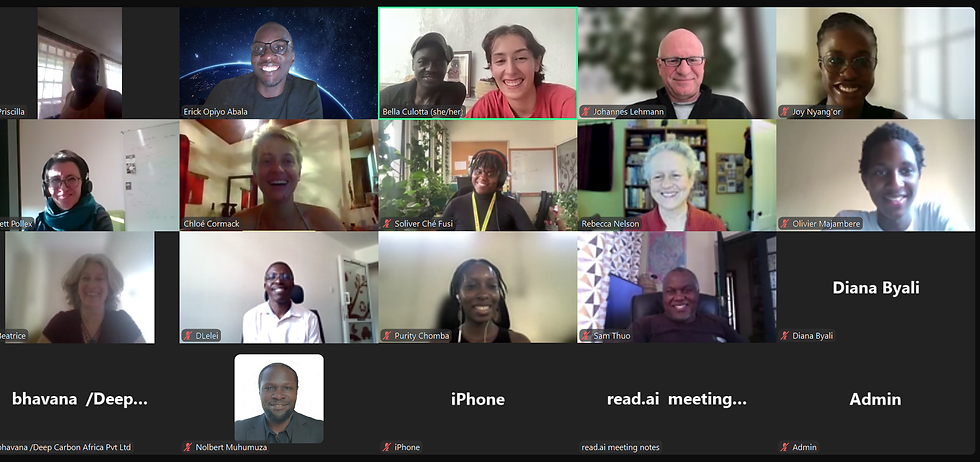CBEN Monthly: Regulatory Landscape for Activated Biochar in Eastern and Southern Africa
- Feb 6, 2025
- 2 min read

The latest CBEN Monthly session featured insightful discussions on biochar's potential in Africa, regulatory challenges, and the importance of fostering sustainable soil restoration practices. The session was led by Joy Nyang'or and Chloe Cormack of Eco Restore, a company dedicated to reversing soil degradation in Africa through biochar application and microbial inoculations.
Only 2% ( Jager) of smallholder farmers in Africa currently use biochar, and Eco Restore aims to significantly increase this percentage. The organization innovates around custom microbial inoculations tailored to different biochar feedstocks and ecological contexts, helping improve soil fertility, water retention, and crop yields. They shared valuable perspectives on advancing biochar adoption across the continent and emphasized the importance of understanding the regulatory landscape for biochar in Eastern and Southern Africa,
Chloe discussed Eco Restore's collaboration with a small-scale biochar producer in South Africa and the challenges of efficiently inoculating biochar for better soil application. Key needs include the harmonization of sustainability criteria and cross-border biochar policy and regulation frameworks. The assessment also examined socio-economic factors, regulatory institutions, and approval processes in each country.
Joy Nyang'or provided an in-depth assessment of biochar regulations in Kenya, Uganda, Ethiopia, Rwanda, and South Africa. She highlighted key findings on biochar regulations, noting that approval timelines vary from 10 to 24 months, with South Africa having the most complex and lengthy process due to its advanced commercial farming sector. It also had one of the most expensive processes, as did Ethiopia. Uganda offers low regulatory barriers and entry costs, but the R&D infrastructure is less developed than South Africa's and Kenya's. Kenya and South Africa benefit from strong research and development support.
The session also explored advancements in biochar kiln technology. Joy and Chloe discussed kiln models developed by Peter an engineer in South Africa, including rotary and horizontal kilns. Annett Pollex shared insights into Ethiopia’s biochar production methods, such as Kon-tiki kilns, muffle furnaces, and double barrel systems. The importance of Polycyclic Aromatic Hydrocarbon (PAH) analysis for ensuring biochar quality was also underscored by scientists and program managers.
The session wrapped up with an emphasis on streamlining the approval processes, the potential for cross-border trade, and the advantages of localized biochar production. Strengthening research and development was identified as crucial for improving biochar quality and stability while developing robust financial structures was seen as essential for supporting biochar businesses and smallholder farmers. As network members shared ideas in response to Eco Restore's presentation, a preliminary Biochar Bio-Fertilizer Policy Working Group was formed. We are excited to see where our WG's efforts will lead! It will most certainly, add to the June 2025 IBI/CBEN Academy and provide an excellent platform to advance biochar utilization, promoting sustainable agriculture and climate conservation.
References
Jager et.al 2021. Biochar in sub-Saharan Africa





Comments